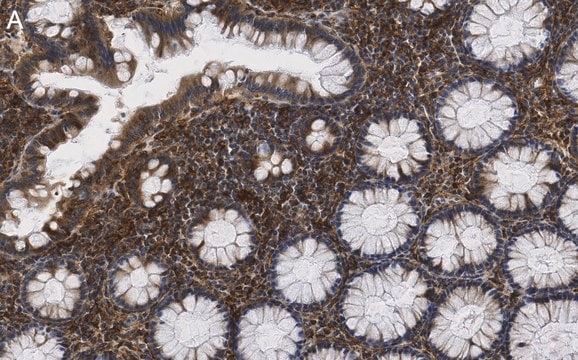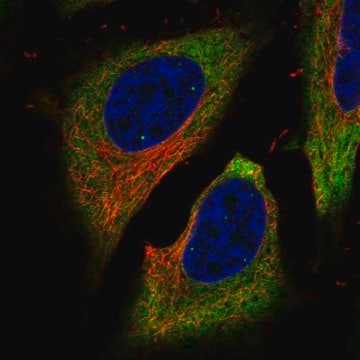MAB3317
Anti-MMP-14 Antibody, hemopexin domain, clone 113-5B7
clone 113-5B7, Chemicon®, from mouse
Synonym(s):
MT1-MMP
About This Item
Recommended Products
biological source
mouse
Quality Level
antibody form
purified immunoglobulin
antibody product type
primary antibodies
clone
113-5B7, monoclonal
species reactivity
rat, human, bovine, mouse
manufacturer/tradename
Chemicon®
technique(s)
ELISA: suitable
immunohistochemistry: suitable (paraffin)
western blot: suitable
isotype
IgG3κ
NCBI accession no.
UniProt accession no.
shipped in
dry ice
target post-translational modification
unmodified
Gene Information
human ... MMP14(4323)
Specificity
Immunogen
Application
Cell Structure
MMPs & TIMPs
When tested against recombinant MT1-MMP (lacking the TM domain) expressed in CHO cells the antibody reacts with a band of ~59 kDa.
Immunohistochemistry: Frozen tissue sections; traditional formalin fixation is problematic. Paraffin-embedded tissue sections with PLP fixation required.
Immunoprecipitation
EIA
Optimal working dilutions must be determined by the end user.
Target description
Physical form
Storage and Stability
Analysis Note
Breast carcinoma tissue
Other Notes
Legal Information
Disclaimer
Manufactured by Daiichi Fine Chemical Co., Ltd
Not finding the right product?
Try our Product Selector Tool.
recommended
Storage Class Code
12 - Non Combustible Liquids
WGK
WGK 2
Flash Point(F)
Not applicable
Flash Point(C)
Not applicable
Certificates of Analysis (COA)
Search for Certificates of Analysis (COA) by entering the products Lot/Batch Number. Lot and Batch Numbers can be found on a product’s label following the words ‘Lot’ or ‘Batch’.
Already Own This Product?
Find documentation for the products that you have recently purchased in the Document Library.
Our team of scientists has experience in all areas of research including Life Science, Material Science, Chemical Synthesis, Chromatography, Analytical and many others.
Contact Technical Service






